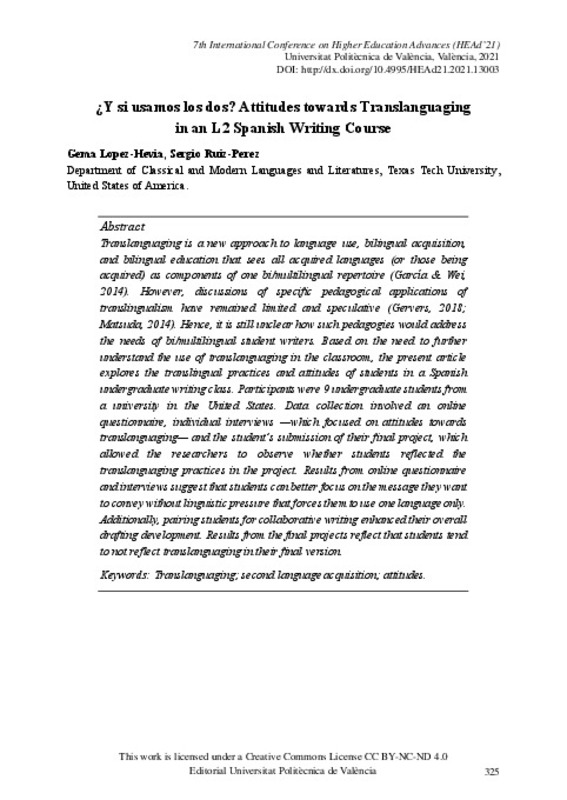JavaScript is disabled for your browser. Some features of this site may not work without it.
Buscar en RiuNet
Listar
Mi cuenta
Estadísticas
Ayuda RiuNet
Admin. UPV
¿Y si usamos los dos? Attitudes towards Translanguaging in an L2 Spanish Writing Course
Mostrar el registro sencillo del ítem
Ficheros en el ítem
| dc.contributor.author | Lopez-Hevia, Gema
|
es_ES |
| dc.contributor.author | Ruiz-Perez, Sergio
|
es_ES |
| dc.date.accessioned | 2021-09-09T07:55:51Z | |
| dc.date.available | 2021-09-09T07:55:51Z | |
| dc.date.issued | 2021-07-26 | |
| dc.identifier.isbn | 9788490489758 | |
| dc.identifier.issn | 2603-5871 | |
| dc.identifier.uri | http://hdl.handle.net/10251/171733 | |
| dc.description.abstract | [EN] Translanguaging is a new approach to language use, bilingual acquisition, and bilingual education that sees all acquired languages (or those being acquired) as components of one bi/multilingual repertoire (García & Wei, 2014). However, discussions of specific pedagogical applications of translingualism have remained limited and speculative (Gervers, 2018; Matsuda, 2014). Hence, it is still unclear how such pedagogies would address the needs of bi/multilingual student writers. Based on the need to further understand the use of translanguaging in the classroom, the present article explores the translingual practices and attitudes of students in a Spanish undergraduate writing class. Participants were 9 undergraduate students from a university in the United States. Data collection involved an online questionnaire, individual interviews —which focused on attitudes towards translanguaging— and the student’s submission of their final project, which allowed the researchers to observe whether students reflected the translanguaging practices in the project. Results from online questionnaire and interviews suggest that students can better focus on the message they want to convey without linguistic pressure that forces them to use one language only. Additionally, pairing students for collaborative writing enhanced their overall drafting development. Results from the final projects reflect that students tend to not reflect translanguaging in their final version. | es_ES |
| dc.format.extent | 9 | es_ES |
| dc.language | Inglés | es_ES |
| dc.publisher | Editorial Universitat Politècnica de València | es_ES |
| dc.relation.ispartof | 7th International Conference on Higher Education Advances (HEAd'21) | |
| dc.rights | Reconocimiento - No comercial - Sin obra derivada (by-nc-nd) | es_ES |
| dc.subject | Higher Education | es_ES |
| dc.subject | Learning | es_ES |
| dc.subject | Educational systems | es_ES |
| dc.subject | Teaching | es_ES |
| dc.subject | Translanguaging | es_ES |
| dc.subject | Second language acquisition | es_ES |
| dc.subject | Attitudes | es_ES |
| dc.title | ¿Y si usamos los dos? Attitudes towards Translanguaging in an L2 Spanish Writing Course | es_ES |
| dc.type | Capítulo de libro | es_ES |
| dc.type | Comunicación en congreso | es_ES |
| dc.identifier.doi | 10.4995/HEAd21.2021.13003 | |
| dc.rights.accessRights | Abierto | es_ES |
| dc.description.bibliographicCitation | Lopez-Hevia, G.; Ruiz-Perez, S. (2021). ¿Y si usamos los dos? Attitudes towards Translanguaging in an L2 Spanish Writing Course. En 7th International Conference on Higher Education Advances (HEAd'21). Editorial Universitat Politècnica de València. 325-333. https://doi.org/10.4995/HEAd21.2021.13003 | es_ES |
| dc.description.accrualMethod | OCS | es_ES |
| dc.relation.conferencename | Seventh International Conference on Higher Education Advances | es_ES |
| dc.relation.conferencedate | Junio 22-23, 2021 | es_ES |
| dc.relation.conferenceplace | València, Spain | es_ES |
| dc.relation.publisherversion | http://ocs.editorial.upv.es/index.php/HEAD/HEAd21/paper/view/13003 | es_ES |
| dc.description.upvformatpinicio | 325 | es_ES |
| dc.description.upvformatpfin | 333 | es_ES |
| dc.type.version | info:eu-repo/semantics/publishedVersion | es_ES |
| dc.relation.pasarela | OCS\13003 | es_ES |








